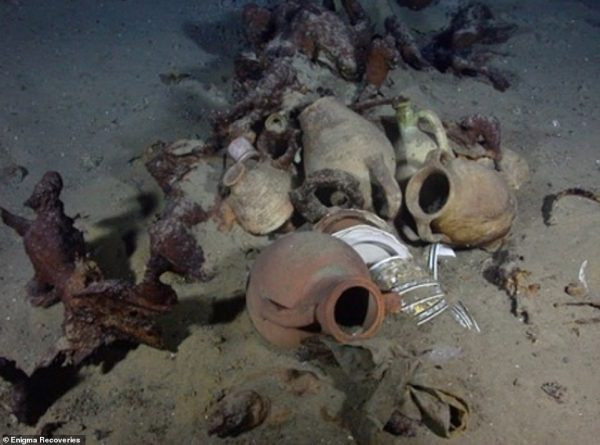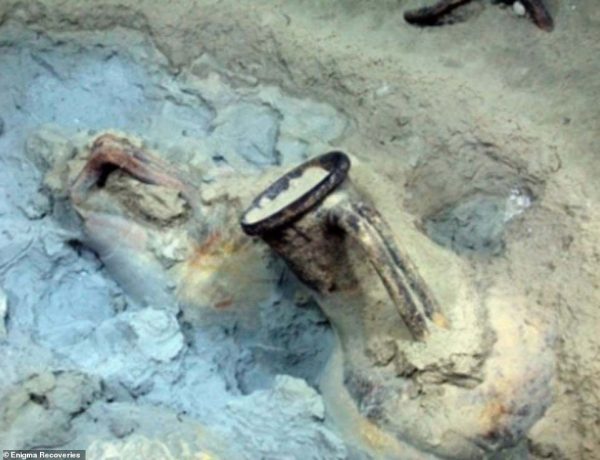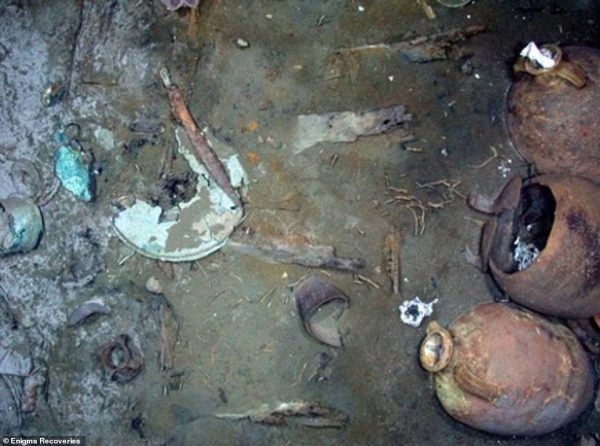‘Like finding a new planet’ Shipwrecks Found Dating From 300 BC
The Mediterranean Sea is full of shipwrecks. If every one of them was visible, the timeline of human history could arguably be traced on the seafloor.
It is only recently, with the advent of digital mapping technology, that the most elusive wrecks are being discovered.
After years of searching, Enigma Recoveries, based out of the United Kingdom, has found a cluster of twelve shipwrecks at the bottom of the Levantine Sea in the Mediterranean Sea’s easternmost portion.
The area is bordered in the north by Turkey, in the east by the Gaza Strip, Israel, Lebanon, and Syria, in the south by Libya and Egypt, and is fed from the northwest by the Aegean Sea.

The ships are lying a mile and a half down between the island of Cyprus and the coast of Lebanon in ancient shipping routes from about 300 BC where silk and spices were delivered to the Ottoman Empire, Greece, and Rome.
The oldest wreck is two thousand two hundred years old, according to Ancient Origins. It is believed a storm was the cause of its demise, and, because of all the religious items found on the deck, researchers believe the crew was praying during the storm.
The largest wreck is a massive one hundred and forty foot long, 17th century Ottoman ship which sailed during the time of Sultan Murad IV and was sunk around 1630.
It was carrying three hundred and sixty Chinese Ming Dynasty ornate porcelain cups and dishes made about 1627, hundreds of amphora—large pottery jugs used to carry wine, olive oils, and fish sauce.
Among other things—iron battle armaments, copper Ottoman style coffee pots that may have belonged to the crew, a bronze cannon, glass and pottery from Spain, Italy, and Belgium, and peppercorns from Malabar, India.
Among the artifacts from other ships are coconuts and grain from Egypt, English pottery, Italian glass, a box of the earliest Ottoman clay tobacco pipes, incense from Arabia, and water jars from Yemen.
Cups found had pastoral country scenes. The Ottomans used them to dally in the new fashion of coffee drinking. Coffee and tobacco were new to much of the world, but at the time they were illegal in the Ottoman Empire having been banned by the Sultan, and coffee shops where people gathered together to smoke and drink coffee instead of tea were considered subversive.

The National quotes Dr. Sean Kingsley, director for the Center for East-West Maritime Exploration, saying “Smoking and the billion dollar coffee industry are seen as markers of modern culture in the Eurocentric view of the world, yet coffee shops were open a century earlier than the West in the Near East.”
The ships were found in 2015, and almost six hundred artifacts were brought up; however the news has only been released in 2020 because all of the items needed to be run through post excavation processes to ensure they were properly preserved.
Most of the items are being held in Cyprus until a dispute between the authorities in Cyprus who reportedly want to sell them at an auction and Enigma Recoveries who say they want the objects placed in a museum is solved.

That report is hotly disputed, according to in-cyprus. The Cypriot Department of Antiquities answered accusations made in articles from The Guardian and The National saying that, in fact, the opposite is true.
According to the Cypriot Department of Antiquities, Enigma Recoveries has a history of inappropriate actions, and they are the ones intending to sell artifacts as evidenced by documents filed with the United States Securities and Exchange Commission.
They also accuse Enigma Recoveries of violating customs laws while retrieving the artifacts. Finally, they emphasize that they have no intention of selling artifacts as it would be not only unethical but also against the Antiquities Law of Cyprus.
England – Crew Stumbles Upon Medieval Shrine in Mysterious Cave
How things will turn out can only be determined by time. Until then, curious scientists and others will have to wait to see what happens to the artifacts that Dr. Kingsley describes as “…the archaeological equivalent of finding a new planet.”





